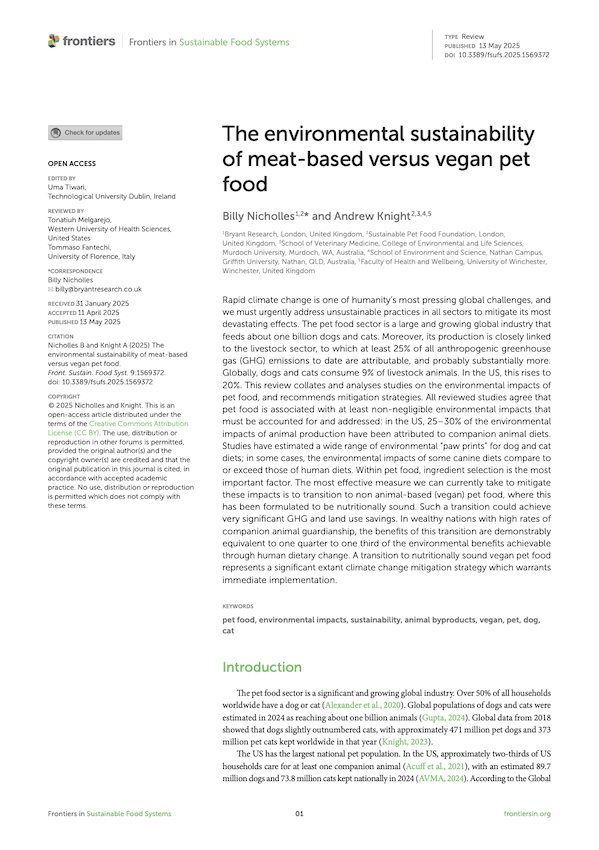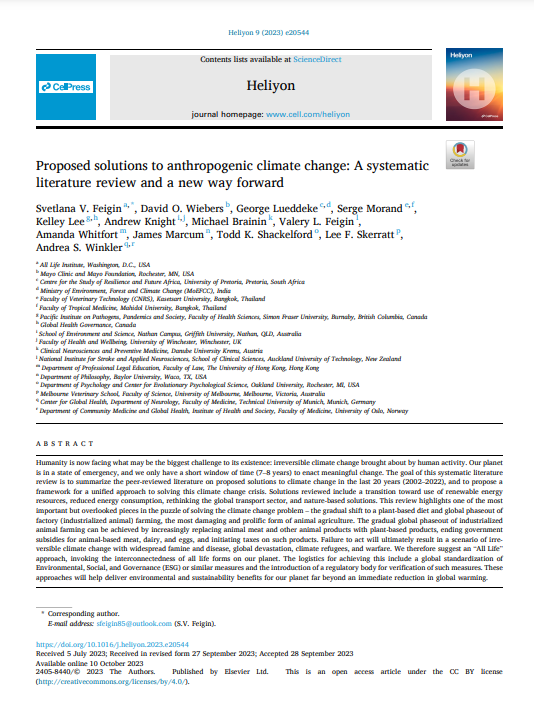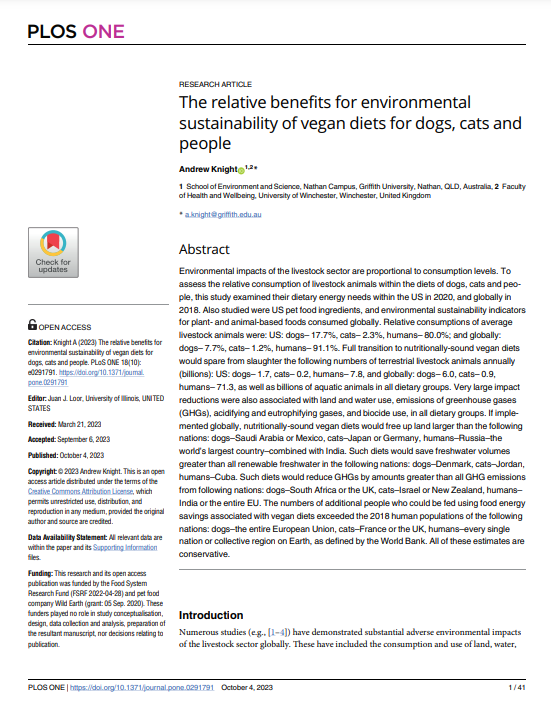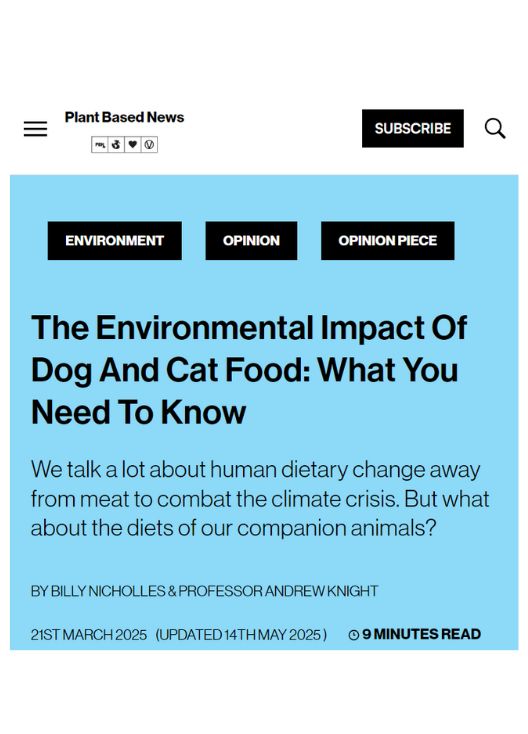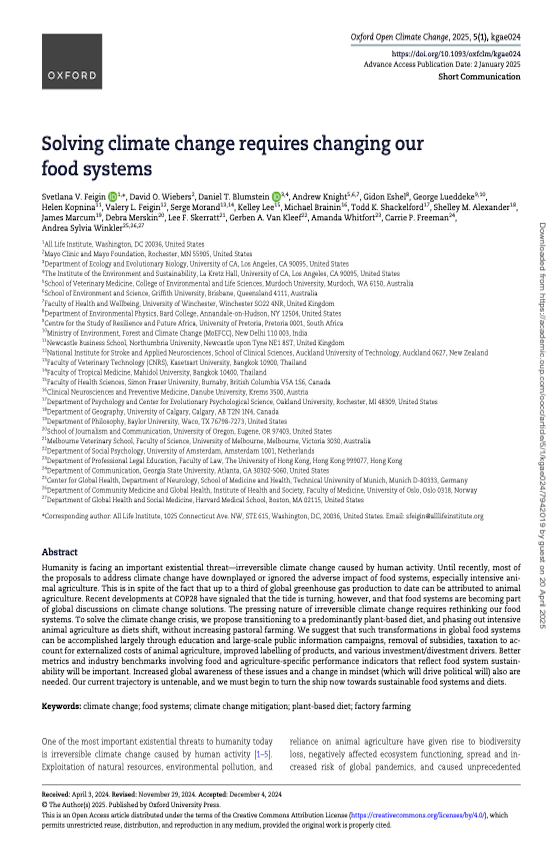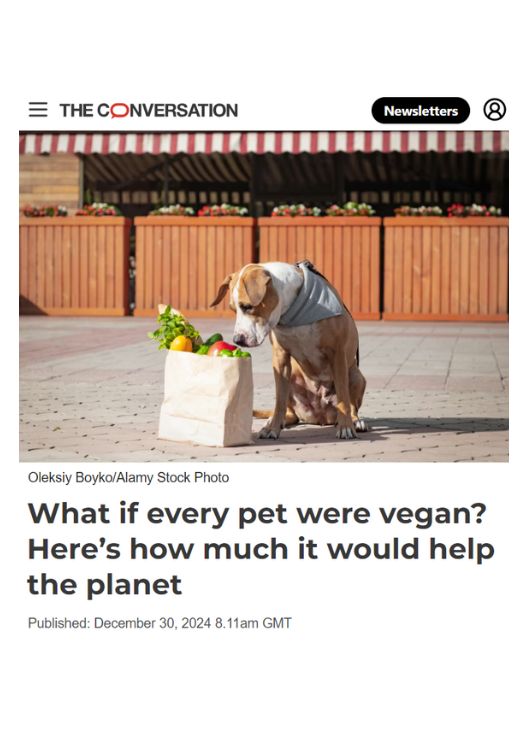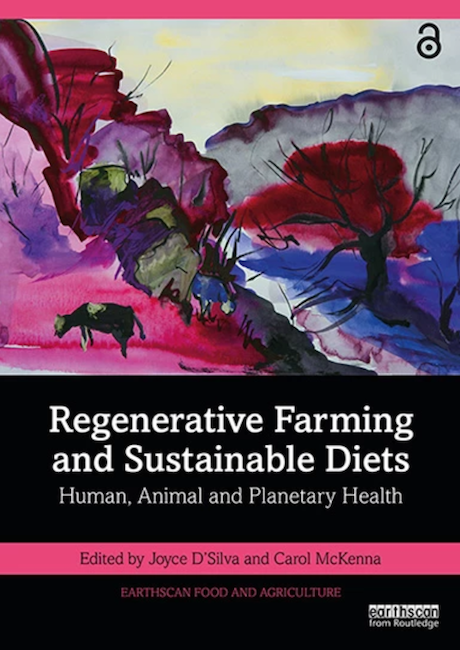
Sustainability
The environmental sustainability of meat-based versus vegan pet food
Abstract
Rapid climate change is one of humanity’s most pressing global challenges, and we must urgently address unsustainable practices in all sectors to mitigate its most devastating effects. The pet food sector is a large and growing global industry that feeds about one billion dogs and cats. Moreover, its production is closely linked to the livestock sector, to which at least 25% of all anthropogenic greenhouse gas (GHG) emissions to date are attributable, and probably substantially more. Globally, dogs and cats consume 9% of livestock animals. In the US, this rises to 20%. This review collates and analyses studies on the environmental impacts of pet food, and recommends mitigation strategies. All reviewed studies agree that pet food is associated with at least non-negligible environmental impacts that must be accounted for and addressed: in the US, 25–30% of the environmental impacts of animal production have been attributed to companion animal diets. Studies have estimated a wide range of environmental “paw prints” for dog and cat diets; in some cases, the environmental impacts of some canine diets compare to or exceed those of human diets. Within pet food, ingredient selection is the most important factor. The most effective measure we can currently take to mitigate these impacts is to transition to non animal-based (vegan) pet food, where this has been formulated to be nutritionally sound. Such a transition could achieve very significant GHG and land use savings. In wealthy nations with high rates of companion animal guardianship, the benefits of this transition are demonstrably equivalent to one quarter to one third of the environmental benefits achievable through human dietary change. A transition to nutritionally sound vegan pet food represents a significant extant climate change mitigation strategy which warrants immediate implementation.
Nicholles B & Knight A (2025). The environmental sustainability of meat-based versus vegan pet food. Front. Sustain. Food Syst. 9:1569372.
Proposed solutions to anthropogenic climate change:
A systematic literature review and a new way forward
Abstract
Feigin SV, … Knight A, et al. (2023). Proposed solutions to anthropogenic climate change: A systematic literature review and a new way forward. Heliyon 9(10), e20544.
The relative benefits for environmental sustainability of vegan diets for dogs, cats and people
Abstract
Environmental impacts of the livestock sector are proportional to consumption levels. To assess the relative consumption of livestock animals within the diets of dogs, cats and peo- ple, this study examined their dietary energy needs within the US in 2020, and globally in 2018. Also studied were US pet food ingredients, and environmental sustainability indicators for plant- and animal-based foods consumed globally. Relative consumptions of average livestock animals were: US: dogs– 17.7%, cats– 2.3%, humans– 80.0%; and globally: dogs– 7.7%, cats– 1.2%, humans– 91.1%. Full transition to nutritionally-sound vegan diets would spare from slaughter the following numbers of terrestrial livestock animals annually (billions): US: dogs– 1.7, cats– 0.2, humans– 7.8, and globally: dogs– 6.0, cats– 0.9, humans– 71.3, as well as billions of aquatic animals in all dietary groups. Very large impact reductions were also associated with land and water use, emissions of greenhouse gases (GHGs), acidifying and eutrophifying gases, and biocide use, in all dietary groups. If imple- mented globally, nutritionally-sound vegan diets would free up land larger than the following nations: dogs–Saudi Arabia or Mexico, cats–Japan or Germany, humans–Russia–the world’s largest country–combined with India. Such diets would save freshwater volumes greater than all renewable freshwater in the following nations: dogs–Denmark, cats–Jordan, humans–Cuba. Such diets would reduce GHGs by amounts greater than all GHG emissions from following nations: dogs–South Africa or the UK, cats–Israel or New Zealand, humans– India or the entire EU. The numbers of additional people who could be fed using food energy savings associated with vegan diets exceeded the 2018 human populations of the following nations: dogs–the entire European Union, cats–France or the UK, humans–every single nation or collective region on Earth, as defined by the World Bank. All of these estimates are conservative.
Knight A (2023) The relative benefits for environmental sustainability of vegan diets for dogs, cats and people. PLoS ONE 18(10): e0291791.
Livestock Casts Long Shadow
Over Climate Debate
Part I: Knight A (2010). Livestock casts long shadow over climate debate. Vet Times, 40(18), 17, 20.
Livestock and climate change
Part II: Knight A (2010). Livestock and climate change. Vet Times, 40(23), 26, 28-29.
Summaries
The environmental impact of dog and cat food: what you need to know
The environmental impact of dog and cat food: what you need to know
Summary
Billy Nicholles and I considered the environmental impacts of vegan vs. meat-based pet foods, in a Plant-Based News article. We considered the meat- and plant-based ingredients within commercial pet foods, and the role of animal byproducts. We even considered emerging alternatives, including cultivated meat and microbial protein-based pet foods. The results are clear: sustainable pet food alternatives offer environmental benefits which are both massive and under-recognised.
Nicholles B and Knight A (2025). The environmental impact of dog and cat food: what you need to know. Plant-Based News. 21 Mar.
Solving climate change requires changing our food systems
Summary
In Oxford Open Climate Change, we proposed that the pressing nature of irreversible climate change requires rethinking our food systems. Said the Editor, “This is a compelling piece of work, and I anticipate that it will make a valuable contribution to the field.” Further information: Murdoch University press release. This was covered in numerous media outlets including Farming National Monthly (UK)).
Feigin SV, …, Knight A, at al. (2025). Solving climate change requires changing our food systems. Oxford Open Climate Change, kgae024.
What if every pet was vegan? Here’s how much it would help the planet
Summary
This article in The Conversation summarised the environmental benefits, food energy savings (additional people who could be fed) and number of ‘food’ animals who would be spared from slaughter annually, if the world’s pet dogs and cats were transitioned on to nutritionally sound vegan diets. These are game-changingly large. E.g. transitioning only the dogs would spare 1.5 x the greenhouse gases produced by the entire UK each year. This was viewed 10,000+ times and reported in several other outlets, e.g. www.Earth.com.
Knight A (2024). What if every pet was vegan? Here’s how much it would help the planet. The Conversation, 30 Dec. 2024.
The environmental benefits of vegan pet food
Summary
This open access chapter within the 2024 book Regenerative Farming and Sustainable Diets edited by D’Silva and McKenna summarises the key results of my recent study on the sustainability of vegan vs. meat-based pet diets. These benefits are game-changingly large.
Knight A (2024). The environmental benefits of vegan pet food. In D’Silva J and McKenna C (Eds). Regenerative Farming and Sustainable Diets. London: Routledge. 92-103.
Promote Flexitarian Diets Worldwide
Lymbery P … Knight A … et al. (2018). Promote flexitarian diets worldwide. Nature 563, 325.
Climate Change:
The Animal Connection
Knight A (2010). Climate change: the animal connection. Vet Practice, 42(2), 52-53.

